Dealing with the Stress of the Pandemic
To help deal with the stress of the pandemic, Associate Dean for Undergraduate Education in the College of Engineering Susan Freeman starts each of her classes with a few moments of meditation and laughter.
Why this engineering professor starts class with a meditation
Main Photo: Susan Freeman, associate dean for undergraduate education and engineering professor, practices meditation with her engineering class in Snell Engineering. Photo by Ruby Wallau/Northeastern University
Susan Freeman bounces with energy as she talks. Her words come tumbling out, their cadence emphasizing their meaning, periodically eliciting laughter from her students. Her hands dance around as if they, too, are part of her voice. All eyes are on the professor.
Freeman starts her first-year engineering class with what she calls “Freeman Foibles of the Day,” a relatable, silly anecdote from her life. More laughter follows when a student selects a few jokes to share from a children’s joke book that Freeman brought from home. She also makes a point to greet every student in the room and on the screen individually, noting new haircuts and posters. The “ding, ding” of Zoom chat messages echo her energy as the remote students return her hellos. The professor’s enthusiasm fills the room.
Then, Freeman’s voice softens. Her movements become more muted, and she slows her speech. It’s time, she tells her students, for mindfulness.
“Close your eyes,” Freeman says. “We’ll start with a couple of deep breaths.”
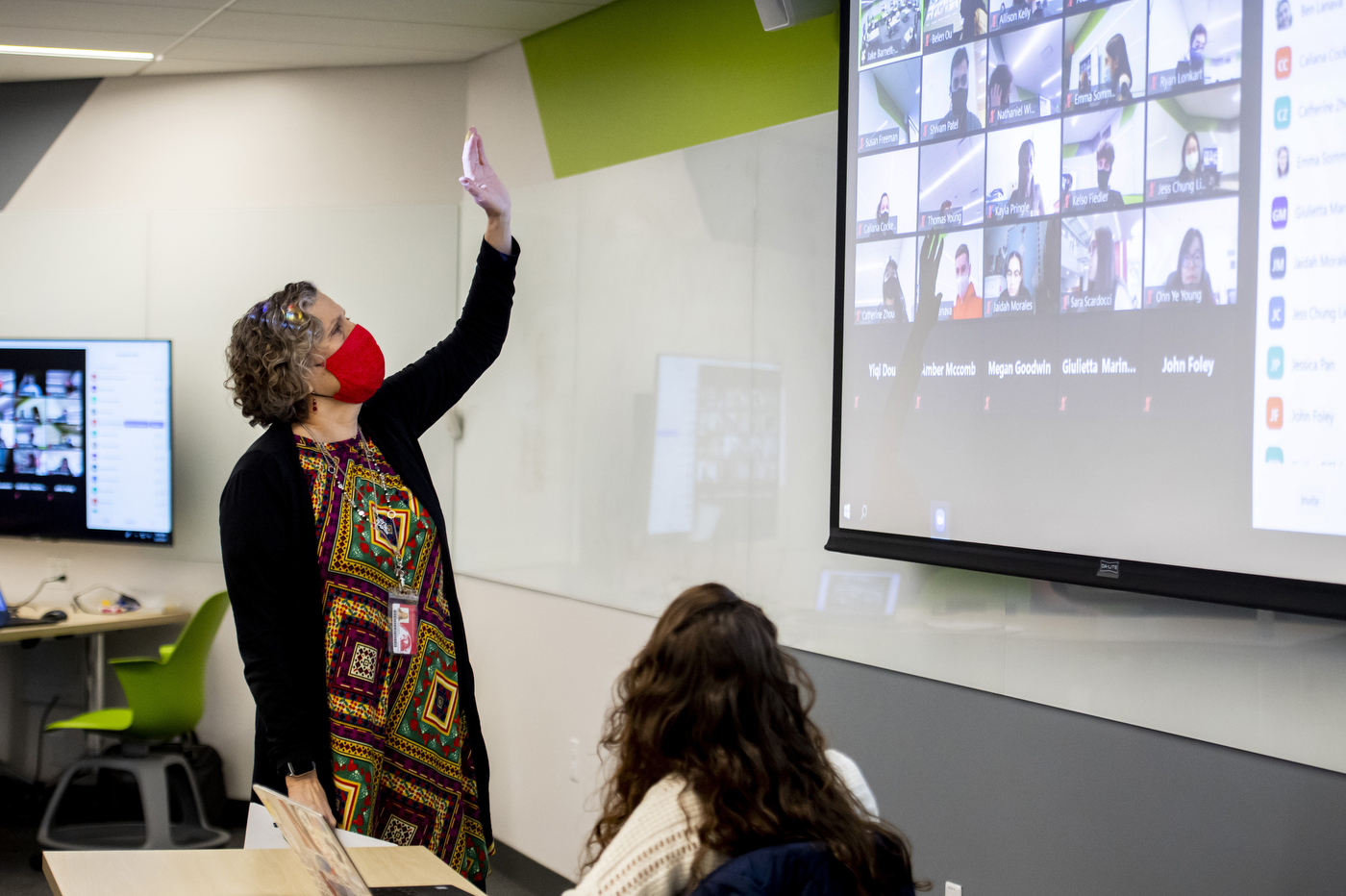
Susan Freeman, associate dean for undergraduate education and engineering professor, waves to virtual students during her engineering class in Snell Engineering. Photo by Ruby Wallau/Northeastern University
Even with her own eyes closed, Freeman continues to gesticulate. “In, out,” she says slowly, her hands rising and falling as if she is a conductor leading the breathing exercise. “In, out.”
The students sit completely still as Freeman guides them through a meditation practice. The focus of the day’s practice is loving kindness, and her voice shepherds the students through an exercise on directing warm thoughts toward people in their lives and themselves.
Freeman, associate dean for undergraduate education in the College of Engineering, starts every session of her Cornerstone of Engineering 2 class with jokes and meditation. She began this routine during the pandemic to share methods to cope with stress, build community in the class, and offer a moment of calm.
“There’s a clear contrast between before and after she does her meditation at the start of class,” says Alli Kelly, a civil engineering major in Freeman’s class. “At the very beginning of class, I often feel very stressed and frazzled, and I can’t really focus on one thing. Coming out of the meditation, I just feel a lot more prepared. I feel more relaxed. I feel like I’m ready to focus on what we’re going to be talking about in class that day.”
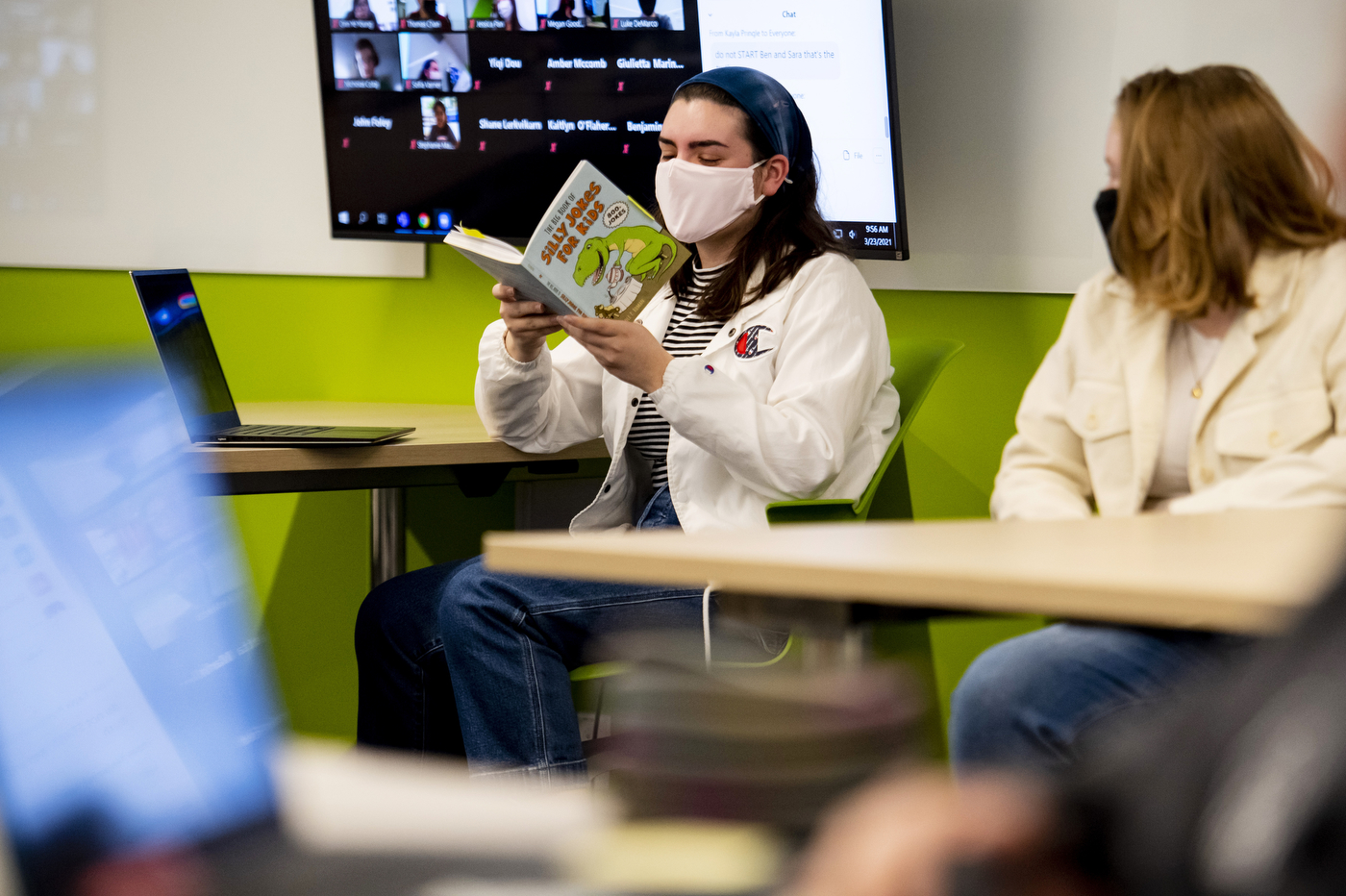 |  |
A student reads jokes at the beginning of an engineering class taught by Susan Freeman, associate dean for undergraduate education in the College of Engineering, in Snell Engineering. Photos by Ruby Wallau/Northeastern University
When Freeman first tried adding mindfulness to her class routine, she began with simple breathing and centering exercises. But since her students told her that they appreciated the meditation component and Freeman herself has learned more about mindfulness, she has branched out, introducing her students to physical relaxing exercises and guided meditations on a theme.
Sometimes the meditation focuses on techniques that Freeman herself is learning, while other times she selects an approach tailored to what she intuits that her students need. For example, when several students expressed in meetings with her that they were feeling discouraged and questioning if they belonged in engineering, she focused a meditation on building confidence.
“I said, ‘While we’re taking breaths and we’re just sort of meditating, I want you to really think about, I belong here. I should be here. I can do this,’ ” Freeman recalls. “I had just sensed that they needed to be encouraged.”
For some students, like Kelsey Hanle, the meditation practices also offer tools for how to navigate classwork. The course involves a long-term group project, and that can feel overwhelming, Hanle says. But, she says, the meditation sets a tone of taking everything step-by-step and working collaboratively with peers, rather than competitively.
“It helps me remind myself, too, ‘OK, be kind to yourself, we are going through a pandemic right now. It’s not the ideal circumstances to be learning in, but you’re still doing it,’ ” says Hanle, a bioengineering major. “You want to tell yourself, ‘You should be proud.’”
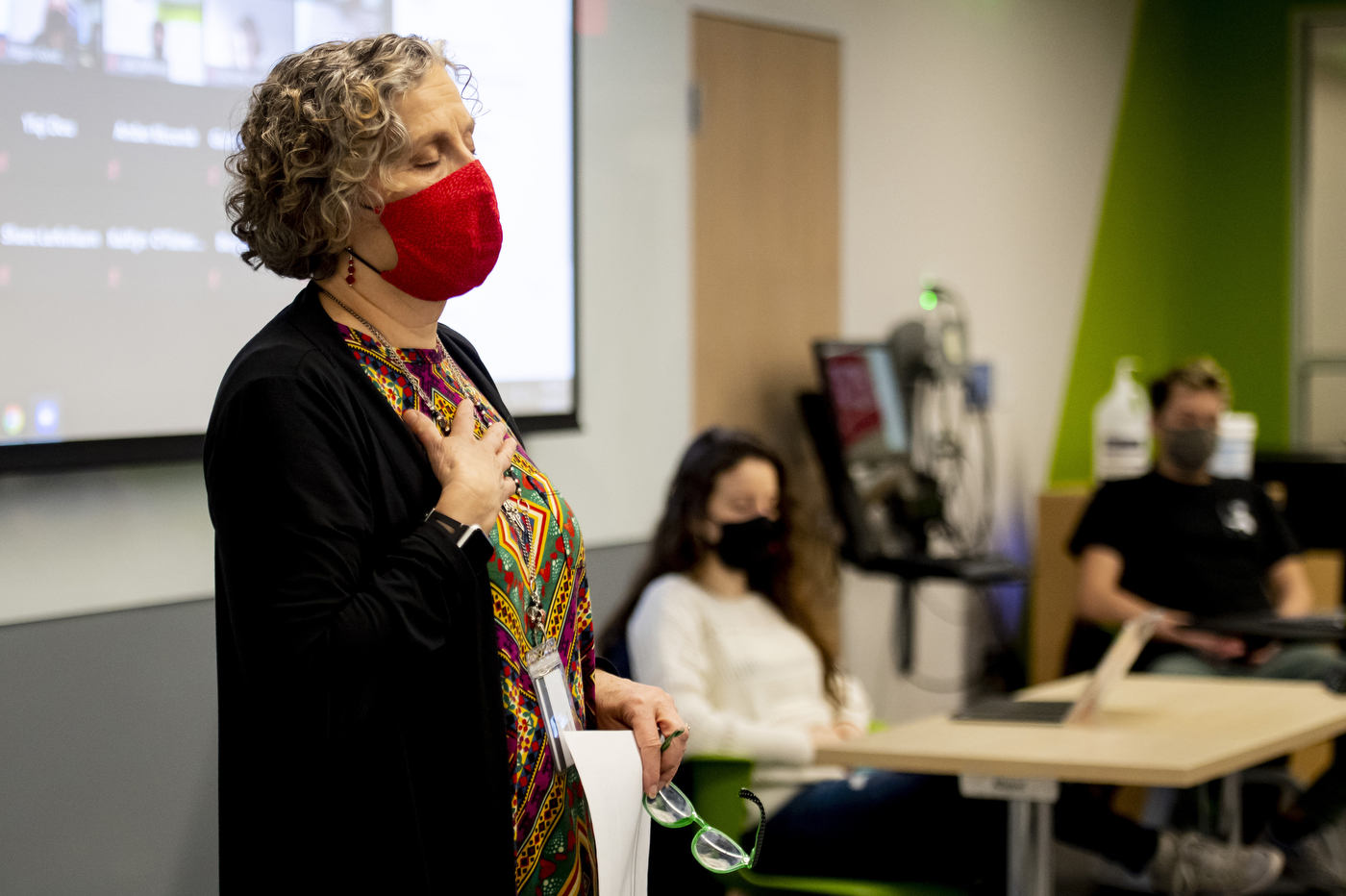 | 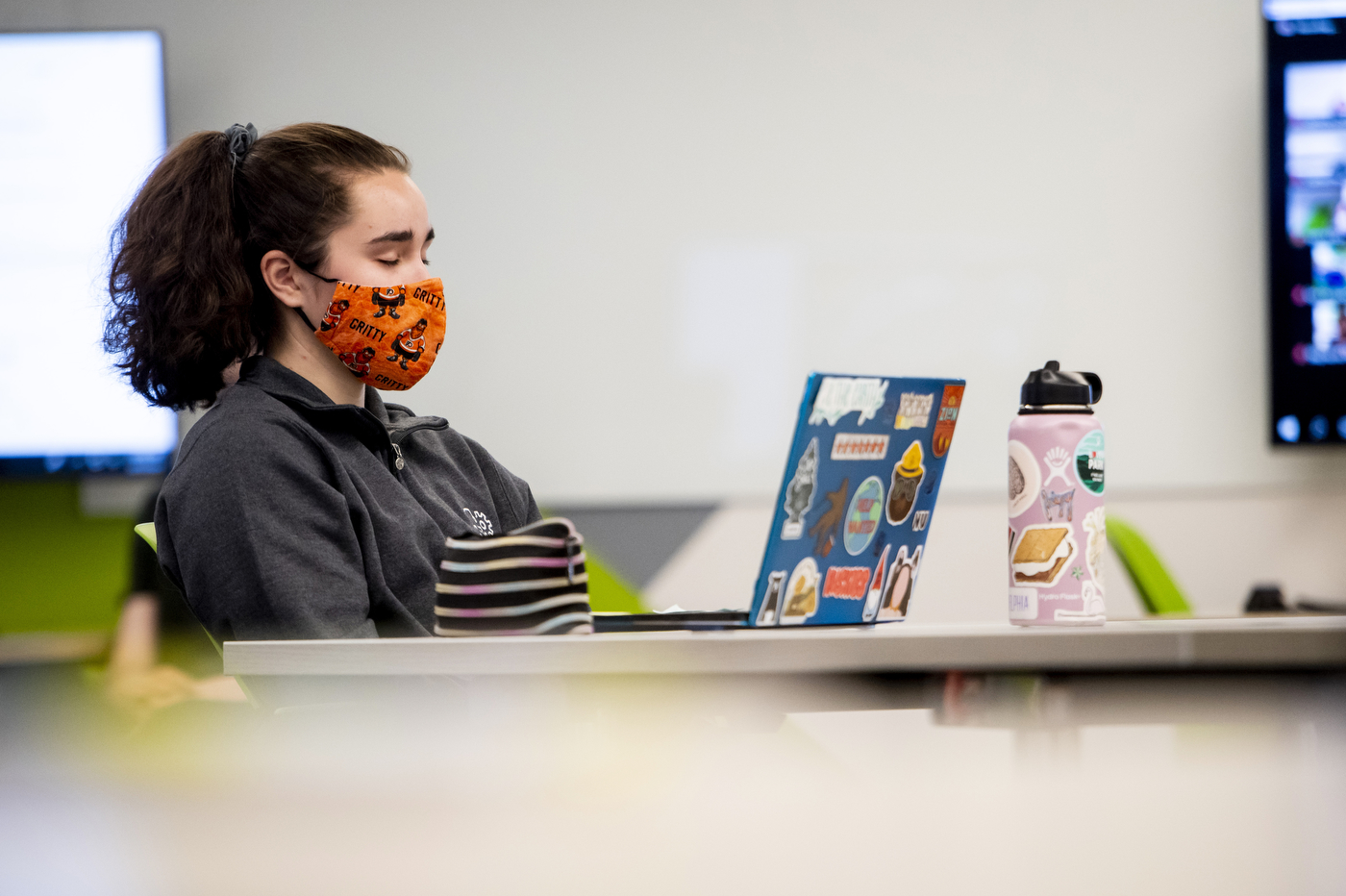 |
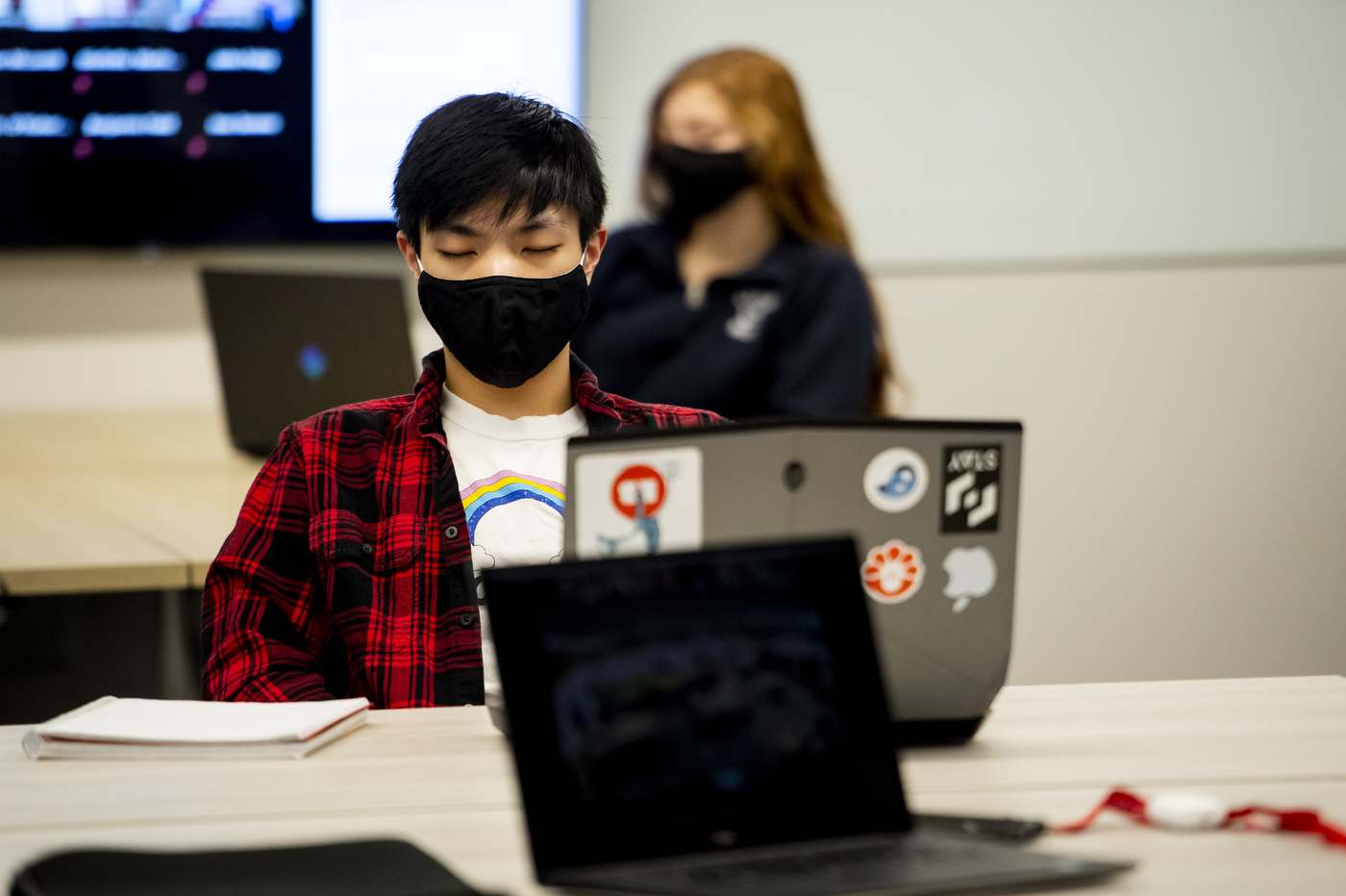 | 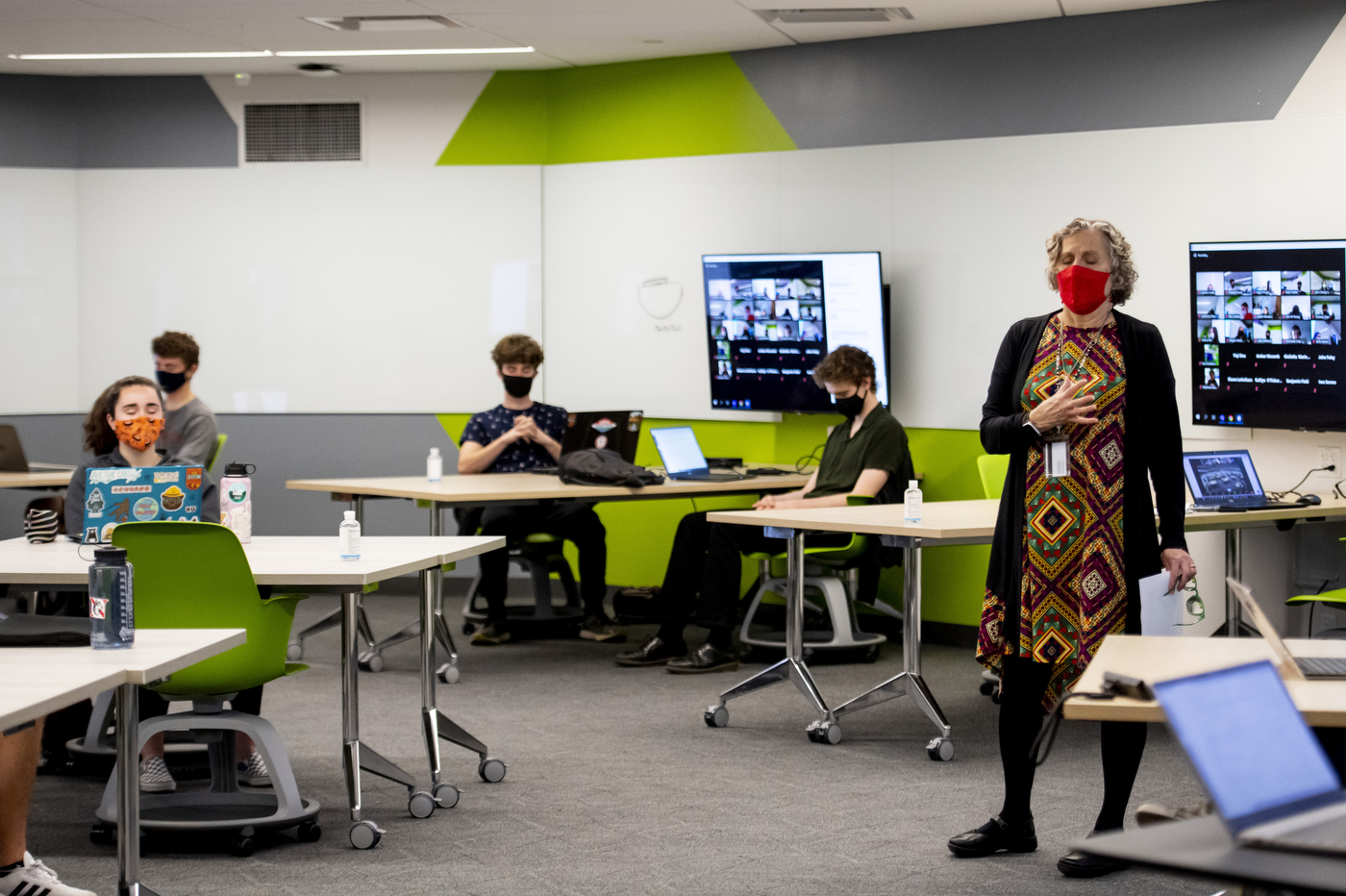 |
Susan Freeman, associate dean for undergraduate education in the College of Engineering, practices meditation with her first-year engineering class in Snell Engineering. “There’s a clear contrast between before and after she does her meditation at the start of class,” says Alli Kelly (top right), a civil engineering major. Photos by Ruby Wallau/Northeastern University
Freeman incorporates her own experiences of stress and how she manages it in the mindfulness practices she shares with her students. This humanizes the professor in a way that Hanle says makes her feel more comfortable asking questions in class and admitting when she doesn’t know something.
That’s intentional. Freeman says she strives to foster “a sense of being partners in the struggle.”
The jokes at the beginning of class are also part of establishing that tone, Freeman says. So when the professor discovered that the joke book she’d purchased to share with her grandchildren had universal humor, she brought it to her engineering class. She asks a student who arrives early to select a few jokes from the book to share at the beginning of each class.
Freeman considers the jokes to be part of the meditation. Humor is a technique that she herself uses to cope with stress, and the jokes engage the students’ attention and add a lightness to put everyone in a good mood.
“As much as mindfulness and meditation can seem like a serious practice,” she says, “it’s actually about finding a place that’s more centered and happy, and looking for that joy.”
Freeman’s classroom is almost always full, despite the option for students to join from home instead during the pandemic through the Hybrid NUflex program. In fact, she says, after all 20 in-person seats have been claimed each week for the Cornerstone of Engineering 2 class, students ask her to let them know if a seat opens up.
Still, Freeman strives to find ways to make every member of her class – in-person or virtual – feel like they’re part of the community by integrating engaging and centering activities like the jokes and meditation, and supporting group work and casual conversation in the Zoom chat function.
“You can tell how much she cares about her students,” Kelly says. “She’s willing to take that time to get to know them, to say good morning to everyone, to make sure that everyone is in a good mood and a good mindset for learning.”
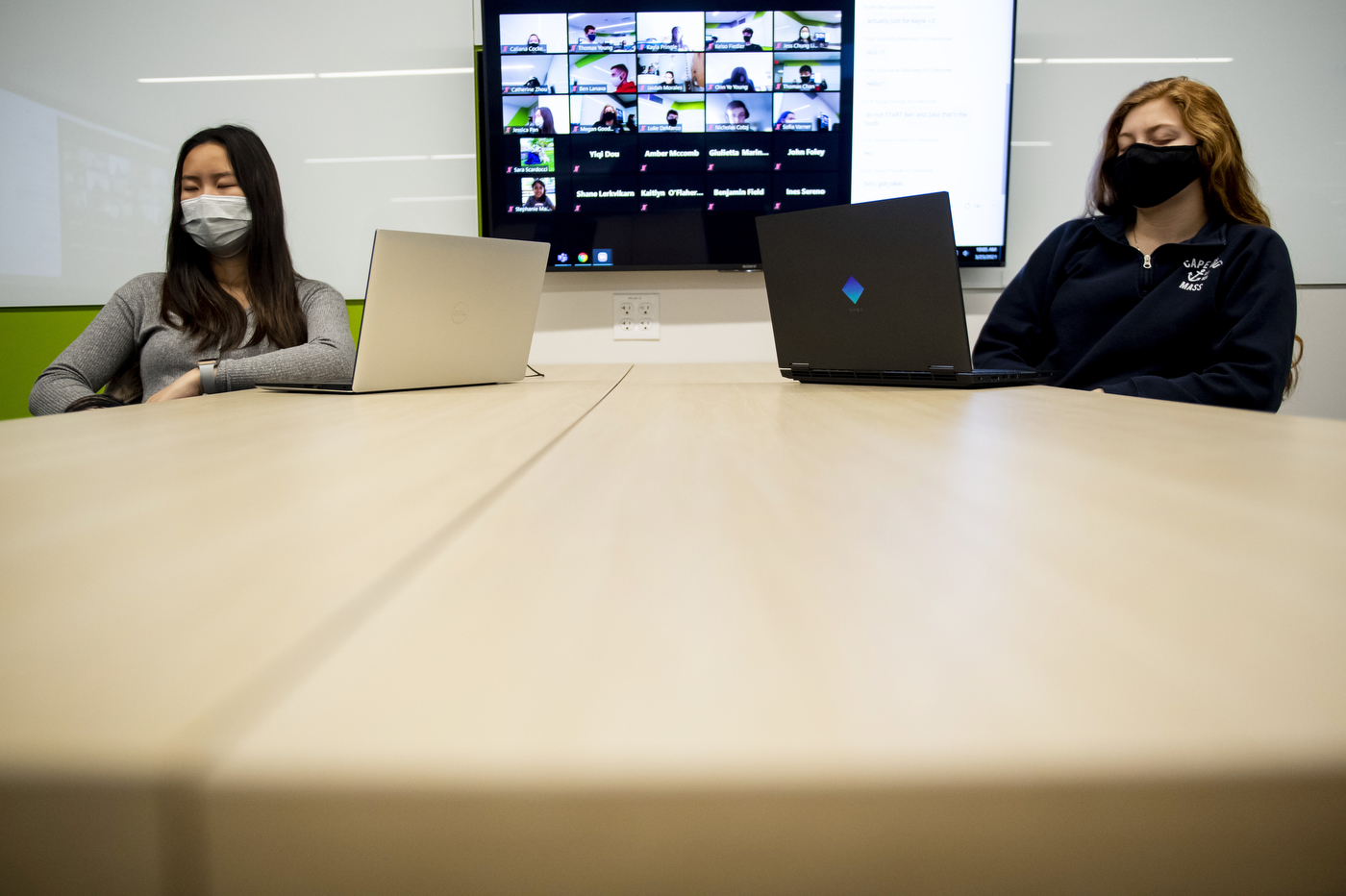
Students take a moment to meditate during an engineering class taught by Susan Freeman, associate dean for undergraduate education and engineering professor, in Snell Engineering. Photo by Ruby Wallau/Northeastern University
After the pandemic, Freeman expects to continue incorporating components of the meditation practice into her classes because stress isn’t going to be eliminated. “I teach first-year students, and there’s always challenges,” she says. “It’s probably good practice for life.”
Techniques from the meditation practice have already begun trickling into life outside of Freeman’s class for Hanle.
“If I ever feel overwhelmed about something, I feel like there’s a little Freeman in my head saying, ‘Is it that big of a deal? Let’s take a couple of breaths.’ ” Hanle says. “I can just hear her voice.”
by Eva Botkin-Kowacki, News @ Northeastern